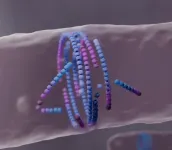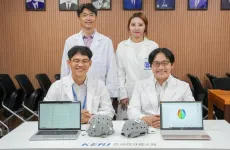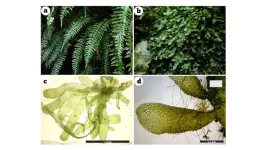(Press-News.org) Despite advancements in clean energy, global CO2 emissions continue to rise. IIASA researchers contributed to a new international study that underscores the importance of integrating technological advancements with robust institutional capacities to formulate effective climate policies.
The Paris Agreement's goal to limit global warming to 1.5°C demands rapid reductions in CO2 emissions and heightened attention to non-CO2 greenhouse gases. Despite advancements in clean energy, global CO2 emissions have risen steadily over the past three years following the initial decline during the COVID-19 pandemic in 2020.
The study published in Nature Climate Change was led by the Center for Global Sustainability (CGS) at the University of Maryland, in partnership with the IIASA-led, Exploring National and Global Actions to reduce Greenhouse gas Emissions (ENGAGE) project – a global consortium of international and multidisciplinary leading research groups.
“These new insights highlight the critical challenges in meeting the Paris Agreement's long-term goals given recent global climate-damaging emissions trends,” notes Bas van Ruijven, study coauthor and coordinator of the ENGAGE project.
The authors set out to co-produce knowledge for designing cost-effective, technologically sound, socially and politically feasible pathways that can meet the objectives of the Paris Agreement. Using eight state-of-the-art multi-regional and process-based global integrated assessment models (IAMs), along with a set of 20 different feasibility scenarios in their analysis, the team found that the institutional dimension (i.e., accounting for limits of countries to enable effective climate regulation) has the largest influence on feasible peak temperature.
“Through rigorous analysis of climate scenarios across eight different models, our research underscores the importance of accounting for the varying capacities of countries as well as regional differences,” explains Christoph Bertram, CGS Associate Research Professor and study lead author. “By combining institutional constraints with technological and socio-cultural factors, we show that the most feasible pathways to achieve the Paris climate goals differ from the most widely used cost-effective benchmarks.”
“From an international fairness perspective this also means that today’s affluent countries like the US and the EU not only need to reach their net-zero targets, but they need to think about multilateral collaborations to enhance the governance and institutional capacity in vulnerable regions,” adds study coauthor and IIASA Energy, Climate, and Environment Program Director, Keywan Riahi.
The study integrates region-specific governance indicators to showcase the capacity for implementing climate mitigation policies effectively. This innovative approach builds on earlier work done in the ENGAGE project to assess the feasibility of transformation pathways for achieving the Paris Climate Agreement, which served as a basis for the new scenario development. The tools and approaches developed as part of the ENGAGE project to explore the multidimensional feasibility of these decarbonization pathways, have been made available to decision makers in a Summary for Policymakers. The new study provides an additional nuanced framework that can be used in future studies for representing institutional capacity across different regions and over time.
“These new scenarios explore the implications of having many countries that potentially lack the institutional capacity to implement ambitious climate policies,” said coauthor Elina Brutschin, a researcher in the IIASA Transformative Institutional and Social Solutions Research Group. “With additional strategies such as rapid demand-side transformation – especially in affluent countries – combined with fast electrification, it could still be possible to limit peak temperature to below 1.7°C.”
"Thanks to the latest advances in low carbon technology deployment such as solar, wind or electric vehicles, the technological feasibility of climate-neutrality is no longer the most crucial issue,” noted coauthor Gunnar Luderer, lead of the Energy Systems Group at the Potsdam Institute for Climate Impact Research (PIK) and Professor of Global Energy Systems Analysis at the Technical University of Berlin. “It is much more about how fast climate policy ambition can be ramped up by governments."
The research underscores the importance of balancing technological advancements with institutional capabilities in formulating effective climate policies and demonstrates that inadequate institutional capacity could hinder reaching even 2°C, whereas improved global institutional support could enhance the likelihood of achieving 1.6°C targets by 25-45%.
As efforts intensify towards the 1.5°C goal, it is imperative for global stakeholders to identify pathways that enhance the feasibility of climate actions and reduce carbon costs. The study’s findings provide valuable insights for guiding ongoing climate policy discussions and future scenario assessments, thereby supporting informed global climate ambitions decision-making.
Reference
Bertram, C., Brutschin, E., Drouet, L., Luderer, G., van Ruijven, B., Reis, L.A., Baptista, L.B., de Boer, H., et al. (2024). Feasibility of peak temperature targets in light of institutional constraints. Nature Climate Change DOI: 10.1038/s41558-024-02073-4
About IIASA:
The International Institute for Applied Systems Analysis (IIASA) is an international scientific institute that conducts research into the critical issues of global environmental, economic, technological, and social change that we face in the twenty-first century. Our findings provide valuable options to policymakers to shape the future of our changing world. IIASA is independent and funded by prestigious research funding agencies in Africa, the Americas, Asia, and Europe. www.iiasa.ac.at
END
Balancing technology and governance are key to achieving climate goals
2024-08-12
ELSE PRESS RELEASES FROM THIS DATE:
Align or die
2024-08-12
A previously unknown mechanism of active matter self-organization essential for bacterial cell division follows the motto ‘dying to align’: Misaligned filaments ‘die’ spontaneously to form a ring structure at the center of the dividing cell. The study, led by the Šarić group at the Institute of Science and Technology Austria (ISTA), was published in Nature Physics. The work could find applications in developing synthetic self-healing materials.
How does matter, lifeless by definition, self-organize and make us alive? One of the hallmarks of life, self-organization, is the spontaneous formation ...
Breakthrough heart MRI technique accurately predicts heart failure risk in general population
2024-08-12
New research looking at more than 39,000 UK biobank participants found those with higher heart pressure estimated by Magnetic Resonance Imaging (MRI) were five times more likely to develop heart failure
Key risk factors discovered for increased heart pressure include age over 70, high blood pressure, obesity, alcohol consumption and male gender
Breakthrough by University of East Anglia and Queen Mary University of London suggests that heart MRI could potentially replace invasive diagnostic tests
Peer-reviewed – Observational Study - People
MRI scans could replace invasive heart tests, as new research shows they can reliably estimate pressures ...
Global study predicts increases in cancer cases and deaths among men, with widening disparities based on age and countries’ economic status
2024-08-12
In an analysis of 30 cancer types among men, investigators uncovered substantial disparities in cancer cases and deaths by age and countries’ economic status—disparities that are projected to widen by 2050. The study is published by Wiley online in CANCER, a peer-reviewed journal of the American Cancer Society.
Men face higher rates of cancer and cancer-related deaths than women, likely due to various factors including lower participation in cancer prevention activities; underuse of screening and treatment options; increased exposure to cancer risk factors such as smoking, alcohol consumption, and occupational exposure to carcinogens; and biological ...
USC study: Drug protects against air pollution-related Alzheimer’s signs in mice
2024-08-12
A new study led by the USC Leonard Davis School of Gerontology shows how feeding mice a drug called GSM-15606 provided protection against air pollution-related increases in proteins linked to Alzheimer’s disease.
Senior author Caleb Finch, USC University Professor and holder of the ARCO/William F. Kieschnick Chair in the Neurobiology of Aging at the USC Leonard Davis School, has studied air pollution’s effects on the brain for several years, especially the consequences of exposure to fine particulates found in pollution from automobiles, factories and more. ...
Mild Cognitive Impairment could be going unreported in rural areas of west Michigan, study suggests
2024-08-12
Grand Rapids, Mich., Aug. 12, 2024 – Corewell Health™ and Michigan State University researchers are the first in the state to use de-identified electronic health records of more than 1.5 million patients to analyze incidence rates and risk factors of mild cognitive impairment, or MCI, in rural and urban areas in West Michigan.
Results showed that many cases could be going undetected among those living in rural communities in the area, and researchers now will use the findings to develop AI tools that can detect MCI earlier among patients across the country.
The retrospective study, which included 10 years of historical patient ...
Brain electrical stimulation suppresses appetite. A new frontier in obesity treatment?
2024-08-12
The R&D on neuromodulation technology for the treatment and management of metabolic syndrome conducted by a team led by Dr. Ki-young Shin of Human Care Electro-Medical Device Research Center, Electro-Medical Equipment Research Division of KERI is underway smoothly.
Metabolic syndrome is a complex of multiple metabolic abnormalities, including obesity, high blood pressure, and high triglycerides, often caused by poor diet and lack of exercise. According to the World Health Organization (WHO), one in eight people worldwide is overweight, making obesity treatment ...
Eco-conscious fashionistas hampered by geographical barriers to return clothing
2024-08-12
Eco-conscious consumers are not well-served by clothing companies claiming green credentials, as shoppers’ location has a major impact on the effectiveness of clothing return schemes, a new study reveals.
Environmental circular economy initiatives for activewear companies are limited by where firms and consumers are located, preventing them from being fully effective.
The clothing industry is one of the biggest global polluters, with fast fashion companies creating cheap clothing that gets thrown away after one or two uses and ends up in landfill. According to the European ...
Redefining the computer whiz: research shows diverse skills valued by youth
2024-08-12
FOR A COPY OF THE STUDY AHEAD OF PUBLICATION, PLEASE ENSURE YOU ARE SIGNED UP TO TAYLOR & FRANCIS’ EMBARGO AREA AND THEN VISIT: https://newsroom.taylorandfrancisgroup.com/redefining-the-computer-whiz-research-shows-diverse-skills-valued-by-youth/
New study reveals diverse perceptions of the 'ideal' computer science student among young people.
Researchers at the University of Reading, with colleagues at King's College London, have uncovered a more nuanced view of what makes an 'ideal' computer science student, challenging long-held stereotypes of geeky, clever, ...
Fern becomes first in suborder to be classed as “independent gametophyte”
2024-08-10
Tokyo, Japan – Researchers from Tokyo Metropolitan University have discovered that the fern Hymenasplenium murakami-hatanakae can become independent gametophytes i.e. live for long periods without a spore-producing sporophyte. They collected specimens from Izu-Oshima Island, Japan, and used DNA analysis to show that this Aspleniineae fern, a suborder encompassing thirty percent of ferns on the planet, was part of this rare class. Studying the species further promises to reveal more about how ferns diversify and adapt.
The “alternation of generations” in plants and algae is the intricate cycle by which they reproduce. Each ...
Study reveals Canadian wildfires are affecting US air quality and raising health concerns
2024-08-09
Climate-driven wildfire events are rapidly transferring harmful particulate matter containing toxic chemicals over long distances, compromising air quality in the New Jersey and New York City areas, according to Rutgers Health research.
Published in Environmental Science & Technology and to be featured on the cover of the journal’s next issue, the study assessed the physical and chemical characteristics of wildfire-related particulate matter and was the first to report this characterization from a climate-driven wildfire event in the densely populated Northeast region.
“Particulate ...


